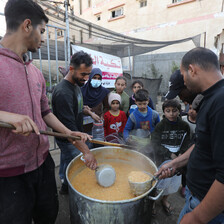Gaza Strip 5 November 2006

Palestinian employees from the ministry of agriculture inspecting the damages at the office of the minister after it was burned during clashes yesterday between Fateh and Hamas in the Gaza Strip, October 2, 2006. (MaanImages/Thaer Al-Hassany)
There is food on the table, huge amounts of rice and cooked meat with vegetables. So many varieties. It would not seem strange except this was in Gaza amid all the reports of starvation and siege.
The host was a dear friend from the business community and the guests were many friends and family relations. Earlier in the day and throughout the days of Ramadan my friend, honest to tradition and Islamic teaching, would distribute sacks of meat and food stuff to the needy.
I had just arrived in Gaza from a long haul in Cairo and I was happy to join the feast and enjoy the company of the people I missed for so long.
We all sat waiting. The majority of people were fasting but there is no way to tell. No one would dare to eat or drink before the call. The beautiful recital of Koran was filling the room and every body was serene and spiritual.
Suddenly we heard “Allah Akbar”. Some people started with a drink and a dried date, went to pray for few minutes thanking God and expressing humility and gratitude. This is what I like about Ramadan. It fills me with memories of my father and his fascination with the blessed month. He was not a keen eating man and was very modest in his demands and tastes in a belief that the true expression of faith is through humility and not pride.
Ramadan is made a festive and entertaining season with an increasing consumer culture, but there is still some resistance to that.
To my right on the table sat my host. He is a big man, with a well established taste for food. He, like many Arabs, is fond of tender meat. It is such a delight to watch people eat with desire in the eyes and taste in the finger tips. Arab food in the best places is eaten by hand.
My host was not busy feeding himself, but was making sure every one else is being served. He served his guests and returned to his seat, and then went for another round of service. When he was sure that he did not forget any body, he sat in his chair and very quickly consumed a few fists full of meat and looked so content and relaxed.
I paid him a compliment commenting on the hospitality and the quality of food. He smiled and said it was his personal pleasure to see me in Gaza and in his home in the blessed month of Ramadan. Then he raised his voice announcing that there will be a round of Konafa, a special Arab sweet.
The whole episode finished within an hour and then we were only four of us relaxingly sipping coffee and smoking cigarettes and hubly buble. I noticed that every one of us looked so full and every one had a sizeable belly, especially our host. I said mildly, “Our food is good for the taste but sea food is best for health.”
One of my friends looked disgusted at the thought and exclaimed, “Sea food, do you call that food? Food is only meat my adorable friend.” I laughed and said, “Only because you are a cannibal. Scientific evidence is telling us that sea food is best for healthy life and this is a fact.”
Our host intervened, saying, “I like a good fish sometimes when it is fresh and well cooked and I agree that we should at least mix our meals. Indeed variation in food is recommended by the prophet.”
Our friend Suhail said, “Fish may be good, but how can you eat snails? How can you eat this thing called calamari which is apparently a leg of a crawling animal?”
I laughed instantly and said, “Do you know what calamari reminds me of? Fatah, your Fatah.”
“What? Fatah and Calamari”? Is this a nasty joke?”
I said, “It is a scientific observation. Look my friend. Calamari is a unique animal. It has eight legs and on each leg there are suckers and crushers and collectors of food. Each leg has its own brain, but the calamari has a head and a central brain which coordinates the life of the animal. The design of this animal is that the central brain has delegated the responsibilities and the functions largely to the eight legs. What happens with Fatah is that each of its legs, and I think there are eight if not more, is functioning independently and in most instances against the other legs, while the head is stunned. This what makes it difficult for any body to deal with Fatah. We know who represent Hamas or the People’s Party or Jihad, but can any one claim to represent Fatah?”
Our host, who was listening keenly, commented quietly, “This is the state of affairs of the general political system. Fatah, Hamas, the President, the Prime Minister, the security forces, the militias, each is an independent leg and in most cases each is trying to kill or destroy, not the animals in the violent sea, but the other legs of the calamari.”
I replied politely, “and if the seriously damaging case of Fatah becomes common then each of our legs will try to eat the other or each leg becomes a delicacy on some strange table for dinner.”
Dr. Eyad al-Sarraj is the founder and director of the Gaza Community Mental Health Programme (GCMHP).
Related Links




